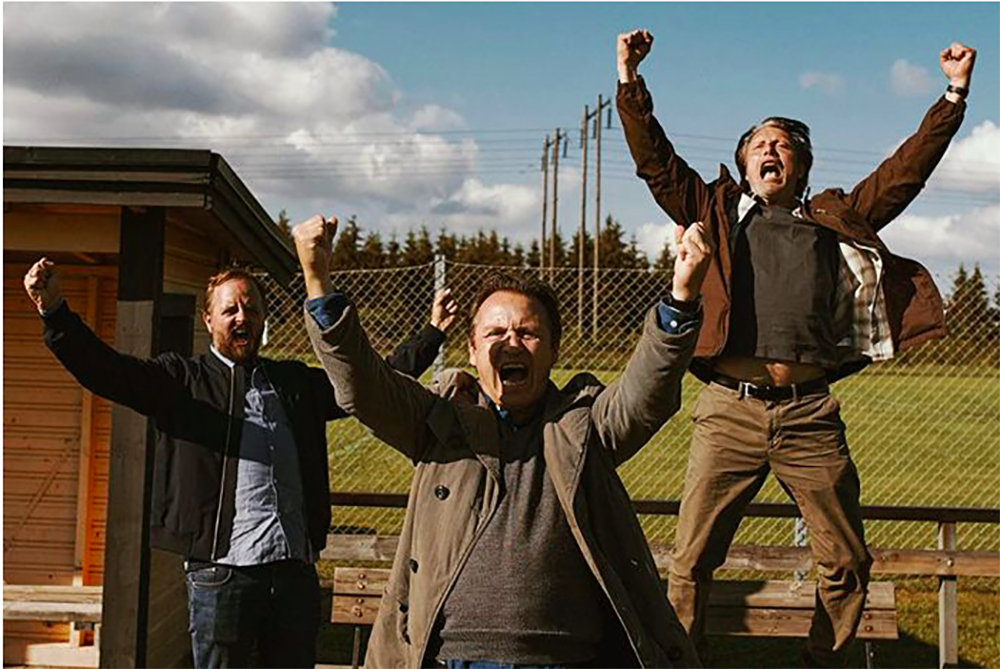The film begins with a number of high school students engaged in a ‘drinking run’ as they must drink a case of beer—whilst running—students (and teams) penalized for vomiting. I had to look this up… and it appears that some form of drinking run (together with sailing) takes place in Denmark, and the drinking culture is something of a thing. Given this, you would expect an exciting film from Director Thomas Vinterberg. However, “Another Round” is a slow, almost biographical picture that details the life of four middle-aged men in various stages of humdrum and mid-life crises. The film stars the aforementioned Mikkelsen, unlike any of his Box Office hits over the last few years, along with Thomas Bo Larsen (Tommy), Magnus Millang (Nikolaj), and Lars Ranthe (Peter). The film focuses on all four, but Mikkelsen and Millang the most.
Can Drinking Improve Your Life: Key Takeaways
“Another Round” is set alongside a simple premise: the four men, celebrating Nikolaj’s 40th birthday, discuss Norwegian philosopher Finn Skårderud, who boasted that humans are born with 0.05% blood/alcohol defect. The tone is somber at dinner; Mikkelsen’s Martin is abstaining from drink as he has to drive home. His friends toast with champagne, vodka, caviar, and house wines. We learn from the film’s beginning, that Martin’s marriage is unhappy. He and his wife, Anika (Maria Bonnevie) work opposite shifts, have teenage sons, and neither is willing to talk to the other about their loneliness. It occurred to me this is one of the first films I’ve seen centering on human loneliness that did not result in cheating or straying from loved ones. Martin—and later, we learn, his friends—have long passed the point of questioning their stultified lives.
That is until the experiment. The next day, Martin sneaks into a bathroom at the public school he teaches at and raises his blood alcohol content to the sought 0.05% by sipping vodka. His history classes—teetering on boredom and confusion to the point his students want him replaced—instantly become a hit. He has joy again. He has life. And weaving Denmark’s drinking culture in and out of his lessons, it’s unlikely his students know he’s buzzed. Mikkelsen lets us know he is through motor deficits and glazed eyes in wonderful, subdued acting. He has to ask his friend Nikolaj (also a fellow teacher; all four of them are) for a ride home and lets him in on what he did. Soon, all four follow suit, with varying results. Mostly positive at the 0.05% level, the group convinces themselves they are conducing a social experiment, and keep data.
A Film About Loneliness, Not Alcoholism

You would expect a film like this to focus on the dramatic, poking fun at scenes of drunkness or stupidity, but Vinterberg knows better. The depictions of intoxication—especially at work—are well done. The camera focus on the act of drinking and the mannerisms of the cast are superb: you really believe these people are day drinking. And whereas in the aforementioned “Flight,” Denzel Washington’s character is an alcoholic, these people are not. Not yet. Their experiment brings out shades of them most have forgotten; and even as both Martin and Nikolaj’s wives express dissatisfaction with their drinking, the saddest part of “Another Round” is not their drinking, but their levity due to it. These are men who have long ago forgotten what it’s like to experience joy. The fact that drinking—and remaining buzzed—throughout the workday brings that joy is what is doleful and painful.
More painful is that Vinterberg highlights their scenes of drinking and camaraderie as joyful but exclusionary. They break into their foursome to drink and discuss, and it feels like a secret club. It feels like one of those days when one has an event at a bar during daytime—a funeral, perhaps—and drinks when they’re typically not supposed to, feeling shame at the stolen moments they didn’t expect. Except this goes on too long, and hints at marital and family problems that were brewing long before “Another Round” began. Martin’s wife laments that he “only has fun when he’s not with her” and she’s not wrong. I think Vinterberg wrongly hints this is Martin’s failing (he suffers from isolation and depression) instead of blaming the pair for their parts. But we don’t know what happened before the film’s start, so maybe that’s fair.
An Anthem to Take Charge of Your Life

As Vinterberg highlights the revelry and stolen moments of these men, he also highlights their pain, and some of the scenes in the film’s third act are harrowing. (*Mild spoilers)—one becomes an alcoholic, two of the men risk their marriage and children, and the fourth, oddly, connects with an overly anxious student by offering him a drink. This latter is not poised as corruption, but forlorn, like the rest of the film: the student is crippled with anxiety so bad he cannot pass his exams, his parents expect him to go to medical school, we know the drill.
And while Vinterberg makes sweeping commentary on Denmark’s drinking culture, I wonder if anyone noticed that the sadness and ennui suffered by the people in this movie are very common phenomenons. That these men feel alone in their struggles causes a sense of dolor I’ve not seen in other films surrounding drinking. And that Martin et al. realize they may have wasted their lives causing their own misery is a takeaway that offers a tinge of hope amidst a sea of melancholy.
Earns its ‘Best International Feature’ Win

“Another Round” is not a perfect film. It sometimes idolizes the men and vilifies the women in their lives. It’s all too easy to blame drinking on relational problems instead of what lies beneath. We don’t get a true sense of why the foursome feel so low, only that they do, highlighted by scenes of drunken revelry and escapism that aren’t intended, but happen as a result. The film teeters on closure for several of the men and then pulls back, Martin showing off some ballet skills he’s not—I’m certain—even been proud of enough to show his wife.
“Another Round” is about rediscovering yourself—or finding yourself for the first time. Its saddest takeaway is that it takes alcohol to do this, and that these problems couldn’t have been addressed without this manner of escapism. But if nothing else, Vinterberg’s film feels wholly authentic, kind of hurts, and makes you want to take charge of your own life. Its 2021 ‘Best International Feature’ win at the Oscars is a testament to that fact.
“Another Round” is currently streaming on Amazon Prime.


